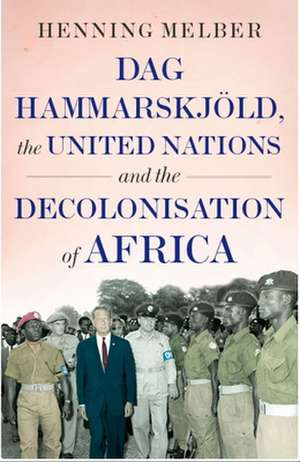DAG Hammarskjöld, the United Nations and the Decolonisation of Africa
Autor Henning Melberen Limba Engleză Hardback – oct 2019
In 1953 Dag Hammarskj�ld became the second Secretary-General of the United Nations--the highest international civil servant. Before his mission was cut short by a 1961 plane crash in then Northern Rhodesia (Zambia), he used his office to act on the basis of anti-hegemonic values, including solidarity and recognition of otherness. The dubious circumstances of Hammarskj�ld's death have received much attention, including a new official investigation, but have perhaps overshadowed his diplomatic legacy--one that has often been hotly contested. Henning Melber explores the years of African decolonization during which Hammarskj�ld was in office, investigating the scope and limits of his influence within the context of global governance. He paints a picture of a man with strong guiding principles, but limited room for maneuver, colliding with the essential interests of the big powers as the 'wind of change' blew over the African continent. His book is a critical contribution to the study of international politics and the role of the UN in the Cold War. It is also a tribute to the achievements of a cosmopolitan Swede.
Preț: 295.74 lei
Nou
Puncte Express: 444
Preț estimativ în valută:
56.60€ • 58.87$ • 46.72£
56.60€ • 58.87$ • 46.72£
Carte disponibilă
Livrare economică 24 martie-07 aprilie
Preluare comenzi: 021 569.72.76
Specificații
ISBN-13: 9780190087562
ISBN-10: 0190087560
Pagini: 296
Dimensiuni: 147 x 224 x 22 mm
Greutate: 0.37 kg
Editura: HURST & CO
ISBN-10: 0190087560
Pagini: 296
Dimensiuni: 147 x 224 x 22 mm
Greutate: 0.37 kg
Editura: HURST & CO
Notă biografică
Henning Melber is Director Emeritus of The Dag Hammarskjöld Foundation and Senior Research Fellow at the Institute of Commonwealth Studies, University of London. He is also President of the European Association of Development Research and Training Institutes, and Extraordinary Professor at the University of Pretoria's Department of Political Sciences and at the University of the Free State's Centre for Africa Studies.
